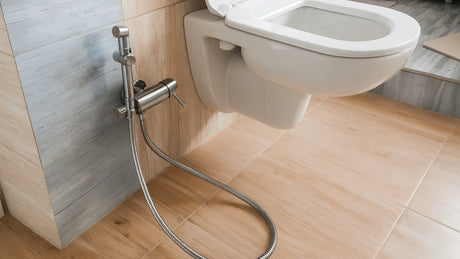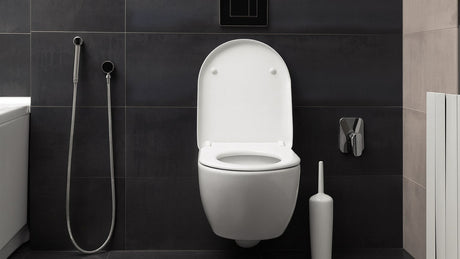While modern chemical cleaners are convenient and efficient, they might irritate your skin and harm the environment. Therefore, many people switch to homemade shower cleaners for their safety and effectiveness against soap scum and grime. So, what homemade shower cleaner can you use? This blog offers 5 options with ingredients and steps. We will also show you how to use them effectively on different shower surfaces and provide some bonus tips to keep your shower sparkling. Let’s begin!

Why Choose a Homemade Shower Cleaner?
Homemade shower cleaner is a healthier and more stable alternative to store-bought chemicals. Here’s why many homeowners are making the switch:
- Cost-Effective: Homemade shower cleaners use ingredients like vinegar, baking soda, and lemon juice, which are much cheaper.
- Eco-Friendly: DIY cleaners reduce single-use plastic bottles and avoid toxic chemicals. They are biodegradable and break down safely in waterways.
- Healthier for Families: Store-bought cleaners emit harsh fumes. Homemade versions use simple ingredients, protecting kids, pets, and allergy sufferers from irritating chemicals.
- Customizable: Create formulas tailored to your needs; you can adjust strength, scent, and purpose based on your preference.
- Highly Effective: Natural acids dissolve soap scum and hard water stains better than some commercial options.
5 Homemade Shower Cleaners
As you can see, the advantages make homemade shower cleaners a smart, sustainable choice for everyday cleaning. Here’s a closer look at 5 proven recipes for everyday maintenance and heavy-duty scrubbing.
1. Vinegar and Dish Soap Cleaner
This is a simple mix that really works. The vinegar helps break down hard water marks, and the dish soap cuts through grease and soap scum. It’s great for cleaning shower walls and glass that get cloudy or slippery.
Ingredients:
- 1 cup white vinegar
- 1 cup dish soap
- 5-10 drops essential oil (optional, for fragrance)
Steps:
Step 1. Heat vinegar in the microwave until warm but not boiling (this enhances its cleaning power).
Step 2. Carefully pour into a spray bottle. Add dish soap and swirl slowly; avoid shaking to reduce foam.
Step 3. Spray liberally on walls and doors, let it sit for 15-30 minutes, rinse with hot water, and wipe with a microfiber cloth.
Best For: Glass doors, ceramic tiles, and routine cleaning.
2. Citric Acid and Dish Soap Cleaner
Citric acid works like vinegar but doesn't smell as strong. It’s great for cleaning hard water marks and mineral build-up on glass or tiles.
Ingredients:
- 1 tbsp citric acid powder
- 1 cup warm water
- 1/3 cup dish soap
- 8 drops citrus essential oil (e.g., orange or grapefruit)
Steps:
Step 1. Dissolve citric acid in warm water before adding other ingredients.
Step 2. Pour into a spray bottle and top up with additional water if needed.
Step 3. Shake gently before each use.
Step 4. Spray on surfaces, allow to sit for 15-30 minutes, then rinse thoroughly.
Best For: Homes with hard water or lime buildup, especially on tiles and grout.
3. Lemon Juice and Dish Soap Cleaner
Lemon juice helps break down grease and leaves a nice, fresh smell. It also helps stop germs, so it’s good for light cleaning and keeping the bathroom smelling clean.
Ingredients:
- 1/2 cup fresh lemon juice
- 1/2 cup dish soap
- 1 cup water
- 1 tbsp baking soda (optional, for extra fizzing power)
Steps:
Step 1: Mix juice, dish soap, and water in a spray bottle.
Step 2: Add baking soda just before use if targeting stubborn buildup.
Step 3: Spray, let it sit for 10-20 minutes, and rinse thoroughly.
Best For: Quick cleans, antibacterial freshness, and light mineral stains.
4. Baking Soda and Dish Soap Paste
This mix is great when you need to scrub tough spots without scratching the surface. It’s gentle but strong enough to clean away dirt and build-up.
Ingredients:
- 1/2 cup baking soda
- 1/2 cup dish soap
- Small amounts of water to adjust the thickness
Steps:
Step 1: Combine baking soda and dish soap until it forms a smooth paste.
Step 2: Apply to problem spots with a sponge or soft brush.
Step 3: Let it sit 5-10 minutes before scrubbing.
Step 4: Rinse away residue with warm water.
Best For: Grimy grout, soap buildup on tubs, and textured shower floors.
5. Hydrogen Peroxide and Rubbing Alcohol Spray
Hydrogen peroxide and rubbing alcohol work well together to keep the shower clean and germ-free. They’re safe to use every day and gentle on most surfaces, even ones that stronger cleaners might harm.
Ingredients:
- 1/2 cup hydrogen peroxide
- 1/2 cup rubbing alcohol
- 1 tsp dish soap
- 1 tbsp rinse aid (for streak-free finish)
- 2 cups water
Steps:
Step 1: Mix all ingredients in a spray bottle.
Step 2: Shake gently to combine.
Step 3: Spray walls and glass after each shower session.
Step 4: Leave to air dry; no rinsing necessary.
Best For: Mould prevention, streak-free glass, and everyday upkeep.
How to Use Homemade Shower Cleaners for Different Shower Surfaces Safely?
Each homemade shower cleaner recipe works differently on various surfaces. Here are guidelines for common surfaces:
Glass Doors: Vinegar and lemon-based sprays cut streaks and buildup effectively. Avoid baking soda, which might cause a scratch.
Ceramic/Porcelain Tiles: These surfaces are hardy, so all recipes are generally safe. For stubborn grout stains, use citric acid or vinegar, but always rinse fully.
Natural Stone (Marble/Granite): Never use acids (vinegar, lemon, citric acid). Instead, use the hydrogen peroxide blend. Acids will etch and permanently dull the finish.
Fibreglass & Acrylic: Stick to the baking soda paste or hydrogen peroxide spray. Acidic cleaners may erode protective coatings.
Note: Always wear protective gloves to shield your skin, ventilate the bathroom well to avoid inhaling fumes, and patch-test new recipes on a hidden spot first to prevent accidental damage or discolouration.
How Often Should You Clean the Shower?
Now that you know the five best cleaners, how often should you use them? Here’s a simple guide to help you keep your shower fresh and clean:
Daily: Quick wipe-downs or sprays with peroxide/alcohol prevent buildup before it starts.
Weekly: In humid climates or for busy households, a lemon or vinegar spray helps keep surfaces fresh.
Bi-Monthly: Perform a deeper scrub with baking soda paste or citric acid mixes to handle hidden dirt and buildup.
If your home has hard water, plan on weekly cleaning to keep mineral deposits from hardening on glass or tiles. Squeegeeing shower doors daily can greatly reduce the effort needed during deep cleans.
For homeowners who seek long-term convenience, upgrading to a MyHomeware shower is a smart choice. These premium showers feature durable, easy-to-clean designs that resist water spots and soap scum buildup, helping your bathroom stay sparkling with minimal effort.

Conclusion
Expensive, chemical-heavy sprays are not always necessary. A homemade shower cleaner can deliver equally powerful results with ingredients that are safer, cheaper, and eco-friendly. With the 5 options in this guide, you can achieve a spotless bathroom while protecting your family’s health, reducing environmental impact, and saving money on store-bought cleaners.
And for those who want an upgrade that makes cleaning even easier, consider a MyHomeware shower. Built with high-quality, low-maintenance designs, it can keep your bathroom looking pristine with less work!
FAQs
Is Vinegar Safe on All Shower Surfaces?
No, it isn’t. Vinegar works great on glass and ceramic tiles because it breaks down soap scum and water marks. But it shouldn’t be used on natural stone like marble or granite — the acid can make the surface dull or leave marks that don’t go away. Always test vinegar on a small hidden spot first. For delicate areas, use gentle cleaners like mild dish soap instead. They’re safer but still clean well.
How to Clean a Severely Dirty Shower?
For heavy buildup, you can start with a vinegar and dish soap mix. Make sure to soak it for 30-60 minutes to loosen grime. Sprinkle baking soda on stubborn spots for fizzing action, then scrub lightly with a sponge or brush to lift dirt. Rinse thoroughly with hot water. For mould or mildew, hydrogen peroxide disinfects and eliminates odours safely, offering a gentler and healthier alternative to bleach-based cleaners.
How Do I Prevent Mould and Mildew Without Harsh Chemicals?
Good ventilation is crucial. Run fans or open windows during and after showers to lower humidity and discourage mildew growth. Daily maintenance also helps. Squeegee walls and glass after use, and mist diluted vinegar weekly to keep mould spores away. Meanwhile, fix leaks quickly and keep corners dry. Add essential oils like tea tree or lavender to DIY sprays to boost antimicrobial power naturally with a fresh feeling.
How Do I Deep Clean My Shower Without Scrubbing?
You can apply a stronger homemade cleaner, like a citric acid solution, and let it dwell longer to dissolve soap scum and stains. Hydrogen peroxide blends are also useful, bubbling away grime while disinfecting surfaces without requiring immediate rinsing or tough scrubbing. After sufficient dwell time, rinse thoroughly with hot water. For stubborn areas, repeat applications gradually until the buildup clears. This can reduce effort while still achieving a deep, sparkling clean.








